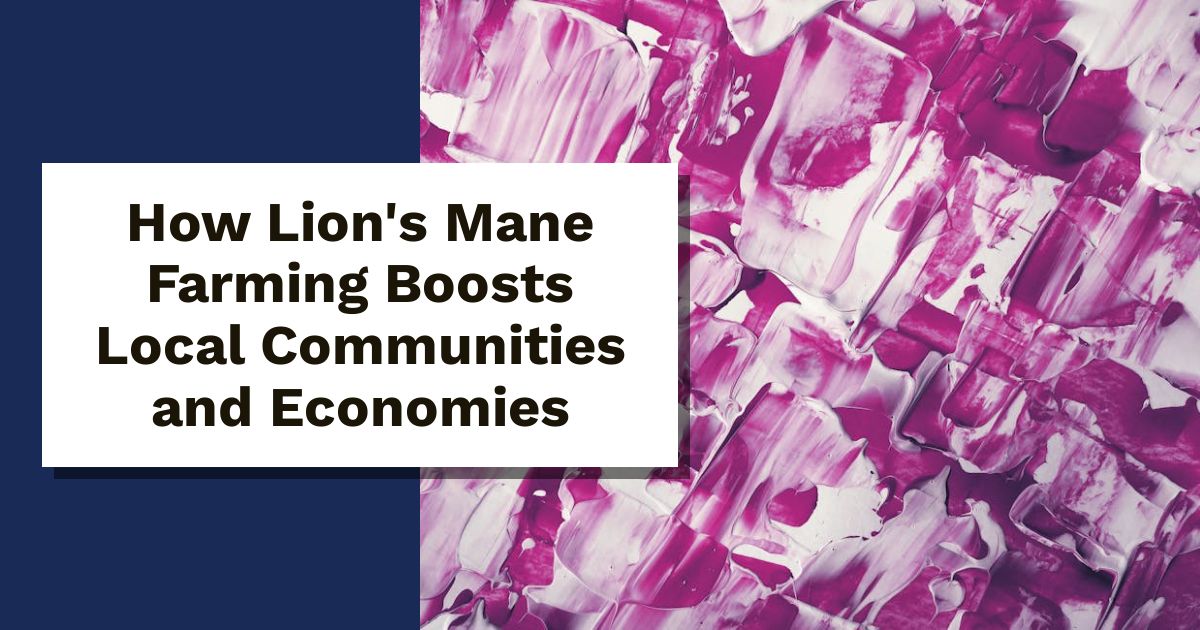Lion’s Mane mushrooms are popping up everywhere, and for good reason. These fuzzy fungi not only offer unique health benefits but also create waves of opportunity in local communities. As more people discover their culinary and medicinal perks, the demand for Lion’s Mane farming is skyrocketing.
But how does this farming trend actually help local communities? By supporting small farms, boosting local economies, and creating jobs, Lion’s Mane cultivation isn’t just about mushrooms. It’s about building stronger communities and enhancing sustainable practices.
In this post, we’ll explore how embracing this mushroom can elevate local economies and foster community growth. You’ll learn why getting involved with Lion’s Mane farming is a tasty way to contribute to your neighborhood while indulging in delicious, nutrient-packed produce. Let’s dig in!
Understanding Lion’s Mane Mushrooms
Lion’s Mane mushrooms are captivating fungi that capture attention for both their appearance and benefits. These unique mushrooms, scientifically known as Hericium erinaceus, grow in a fluffy, white form, resembling a lion’s mane. They typically sprout on hardwood trees, adding an enchanting touch to their surroundings.
Their shaggy spines set them apart from other mushrooms. When cooked, they have a delicate taste, often described as seafood-like. This makes them a favorite among culinary enthusiasts looking for a twist in flavor.
What Are Lion’s Mane Mushrooms?
These mushrooms boast distinctive features. They can grow up to 12 inches in diameter and prefer temperate climates. Commonly found in Asian cuisine and traditional medicine, Lion’s Mane mushrooms are gaining popularity for their culinary and health properties. Their striking appearance and rich nutritional profile make them an exciting addition to both meals and health routines.
To learn more about Lion’s Mane mushrooms, check out WebMD.
Health Benefits
The health benefits of Lion’s Mane mushrooms are increasingly recognized. Adding these mushrooms to your diet can have various positive effects. Here are several key benefits:
- Cognitive Support: Research suggests that Lion’s Mane may improve memory and focus. Studies show they can potentially protect against dementia and cognitive decline.
- Mood Enhancer: Some evidence indicates that they may reduce symptoms of anxiety and depression, promoting a healthier mindset.
- Nerve Repair: Lion’s Mane mushrooms can stimulate the production of nerve growth factor (NGF), vital for healthy nerve function.
- Immune Boost: These mushrooms support immune health, promoting the growth of good bacteria in the gut.
- Anti-Inflammatory Properties: Their antioxidant-rich composition may help fight inflammation, contributing to overall wellness.
For a deeper dive into the benefits of Lion’s Mane mushrooms, visit Healthline. These powerful fungi aren’t just a culinary delight—they also pack a punch when it comes to health!
Economic Impact of Lion’s Mane Farming
Lion’s Mane farming goes beyond just growing mushrooms; it actively contributes to local economies and communities. As more people engage in this sustainable practice, the benefits become evident. Let’s explore some of the key economic impacts.
Job Creation
Mushroom farms are fantastic job creators. As local farms emerge, they require hands-on labor, which leads to new employment opportunities. From picking mushrooms to managing cultivation, various roles pop up.
Consider this: farming jobs often attract workers from diverse backgrounds, adding to the community’s vibrancy. With the increasing interest in sustainable agricultural practices, Lion’s Mane mushroom farms can generate meaningful, year-round jobs. According to the World Bank, agriculture plays a crucial role in youth job creation, supporting economic stability in rural areas.
Boosting Local Businesses
Lion’s Mane farming fuels the local economy by connecting with other businesses. When a mushroom farm thrives, it creates a ripple effect. Local restaurants turn to nearby farms for fresh ingredients, enhancing their menus. This not only brings in more customers but also supports the farm directly.
Additionally, markets and grocery stores benefit. They can stock these unique mushrooms, attracting health-conscious shoppers. The partnership between farms and businesses strengthens community ties and fosters local entrepreneurship. The growth of mushroom farming can lead to an increase in local consumption and awareness. For more on the economic integration of mushroom farming, check out Mushroom Media Online.
Increasing Property Values
Farming initiatives, like Lion’s Mane cultivation, can have a surprising influence on property values. As rural areas develop agricultural projects, more people may be drawn to the community. This influx can lead to rising demand for housing, ultimately boosting property values.
Investors and first-time buyers often seek areas with flourishing agriculture. Not only do they enjoy the benefits of a strong local economy, but they also appreciate the environmental aspects of farming. As a result, communities benefit from increased property values, making homeownership more appealing. This creates a win-win situation for both residents and the local government.
In summary, Lion’s Mane farming enriches communities economically through job creation, support for local businesses, and increased property values. By engaging in this vibrant farming practice, communities can enjoy a robust and sustainable future.
Environmental Benefits
Lion’s Mane farming is not just good for you; it’s good for the planet too! As more farmers grow these unique mushrooms, they adopt practices that are kinder to the environment. Let’s take a look at how Lion’s Mane farming champions eco-friendliness and boosts local ecosystems.
Sustainable Practices
Sustainable farming of Lion’s Mane mushrooms relies on eco-friendly methods. Growers emphasize practices that prioritize soil health and minimize waste. Here are some key approaches:
- Organic Waste Utilization: Farmers often use agricultural by-products like straw or wood chips as growth substrates. This helps recycle waste while providing an ideal environment for the mushrooms to flourish. For further insights, check out How Mushroom Cultivators Create Sustainable Farms.
- Reduced Water Consumption: Mushroom farming generally uses less water than traditional crops. This conserves precious water resources while still yielding high-quality produce.
- Soil Enrichment: After harvesting, the substrate can be recycled for other uses, enriching soil health. This regenerative approach supports healthy ecosystems and boosts agricultural sustainability. Discover more in The Mushroom Sustainability Story.
- Minimal Pesticide Use: Many Lion’s Mane farms practice Integrated Pest Management (IPM). This method focuses on natural pest control, cutting down the need for chemicals and keeping the environment safe. Learn more about sustainable practices in mushroom farming at More About Mushroom Sustainability.
Biodiversity Support
Lion’s Mane farming promotes local biodiversity in multiple ways. As mushrooms grow, they interact with the surrounding environment, encouraging a healthy ecosystem. Here’s how:
- Soil Health Improvement: Mushrooms play a vital role in maintaining soil biodiversity. They enhance nutrient cycling and structure, ensuring that plants thrive. This benefits all the organisms that rely on a healthy soil ecosystem. For more on this, check out How Mushrooms Support Ecosystem Health and Biodiversity.
- Habitat Creation: Mushroom farms can create habitats for beneficial insects and other wildlife. This fosters a balanced ecosystem and helps control pests naturally.
- Carbon Sequestration: Fungi, including Lion’s Mane, can help sequester carbon, which is a great ally against climate change. Their growth process sucks carbon from the atmosphere and stores it in the soil, contributing to a healthier planet.
By choosing Lion’s Mane farming, communities not only engage in sustainable practices but also play a significant role in supporting local ecosystems. Isn’t it wonderful to see how something as simple as a mushroom can have such a profound impact on our environment?
Community Wellness and Education
Fostering community wellness and education is a key benefit of Lion’s Mane farming. By teaching locals about mushroom cultivation and healthy eating, communities can thrive together. This section highlights how hands-on workshops and nutrition education programs can uplift and empower neighborhoods.
Community Workshops
Hands-on workshops are a fun way to teach mushroom farming techniques to local residents. These workshops create a buzz around Lion’s Mane mushrooms and connect people with sustainable practices. Attendees learn valuable skills in a friendly setting, allowing them to cultivate mushrooms right at home.
Here are some exciting aspects of community workshops:
- Skill Development: Participants gain practical knowledge about growing and harvesting mushrooms. They learn about the life cycle of Lion’s Mane, proper cultivation techniques, and how to create the ideal growing environment.
- Community Bonding: Workshops foster a sense of belonging. Neighbors come together, share ideas, and establish valuable connections. This camaraderie can lead to lasting friendships and collaborative projects.
- Resource Sharing: Participants often exchange tips and resources, making it easier for everyone to succeed. They can share substrates, tools, and even their experiences, creating a supportive network.
Local organizations, like Cornell Small Farms, offer excellent resources for mushroom farming workshops. These initiatives teach everything from basic mushroom cultivation to advanced techniques, helping communities thrive in this exciting venture.
Nutritional Education
Nutrition education is essential for community wellness. Programs that inform locals about healthy eating and the benefits of incorporating mushrooms into their diets can significantly impact overall health. Lion’s Mane mushrooms, in particular, are packed with nutrients and known for their cognitive and immune-boosting properties.
Benefits of nutrition education programs include:
- Informed Choices: Community members learn how to make healthier food choices. They understand the significance of balanced diets and how mushrooms like Lion’s Mane contribute to well-being.
- Interactive Learning: Programs often involve cooking demonstrations, hands-on activities, and tastings. Participants can sample dishes featuring Lion’s Mane mushrooms, making healthy eating more appealing.
- Support for Local Farmers: Promoting nutrition education helps create demand for local produce. As community members become aware of these health benefits, they may choose to buy from nearby growers.
For more insights into nutrition education, check out the CDC’s healthy eating resources. These programs create a ripple effect, encouraging healthier lifestyles while supporting local farming initiatives. Educating communities leads to empowered individuals and a healthier population. Together, they can savor the joys of Lion’s Mane mushrooms in their dishes while fostering a united and health-conscious community.
Connecting People
Lion’s Mane farming doesn’t just make for delicious meals; it also brings people together. Whether at farmers markets or through volunteer projects, the connections that sprout from this mushroom cultivation are as important as the crops themselves. Let’s explore how these activities foster community spirit and involvement.
Building Community Ties
Farmers markets and local events create a buzz that helps build strong community ties. Imagine a sunny Saturday morning filled with laughter, fresh produce, and friendly chatter. This is the magic of farmers markets! They are more than just places to buy food; they’re hubs of connection.
Local farmers markets offer:
- Fresh Connections: Farmers get to know their customers, sharing stories about their growing practices and the benefits of Lion’s Mane mushrooms.
- Community Spirit: Events often feature local music, art, and food, turning a simple market visit into a vibrant community gathering. Check out Farmers Markets Support Healthy Communities for more insights.
- Resource Sharing: These markets provide a platform for local artisans and entrepreneurs, strengthening the community’s economy and supporting small businesses.
As residents engage in these markets, they forge friendships, exchange recipes, and share tips on incorporating Lion’s Mane into their diets. These interactions help knit the fabric of the community tighter, making it a welcoming place for all.
Volunteer Opportunities
Farming projects also create numerous volunteer opportunities. They invite community members to roll up their sleeves and get involved. Volunteer work at farms is a fun and rewarding way to contribute.
Consider what volunteering offers:
- Skill Building: Volunteers learn essential farming techniques, from planting to harvesting. They gain hands-on experience that can lead to new interests or career paths. Explore more through WWOOF: World Wide Opportunities on Organic Farms.
- Making a Difference: Helping out on a local farm not only supports the growers but also the entire community. Volunteers often work together for common goals, creating a deep sense of purpose and belonging.
- Cultural Exchange: Farms that welcome volunteers from different backgrounds enrich the community’s cultural landscape. These experiences create opportunities to share traditions and knowledge about sustainable farming practices.
If you’re interested in volunteer farming opportunities, check out Mile High Farmers for a taste of what’s on offer in your area!
Lion’s Mane farming is more than just a growing trend. It cultivates connections that thrive within local communities, enhancing social bonds and encouraging active participation. Whether through bustling farmers markets or hands-on volunteering, everyone can play a role in this exciting movement.
Future of Lion’s Mane Farming
The future of Lion’s Mane farming is looking bright, thanks to the growing interest in health foods and innovative farming methods. As more people become aware of the benefits of these unique mushrooms, the desire for local cultivation will likely surge. Let’s explore how this trend can shape the future.
Growing Demand
As folks become more health-conscious, the demand for Lion’s Mane mushrooms is on the rise. These fungi are not just delicious; they are packed with health benefits. With the popularity of functional foods soaring, Lion’s Mane is now a hot topic.
Here’s what’s driving that demand:
- Health Awareness: More people are diving into the world of health foods. They’re eager to improve their diets, which opens the door for Lion’s Mane mushrooms. Their potential cognitive and immune-boosting properties make them a top choice.
- Culinary Interest: Chefs and home cooks alike are experimenting with Lion’s Mane in various dishes. Its seafood-like texture makes it a great meat substitute. As culinary trends shift, the appeal of these mushrooms is growing.
- Sustainable Practices: Many consumers want fresh, locally-sourced produce. This creates an opportunity for local farmers to step up and meet the demand. Growing Lion’s Mane mushrooms can lead to a thriving local market while promoting eco-friendly farming.
The drive for Lion’s Mane farming may lead to new local businesses sprouting up dedicated to sustainable agriculture. This could be a win-win for farmers and communities alike. For more on the increasing demand for Lion’s Mane due to its medicinal properties, see Demand for Lion’s Mane mushrooms increases due to medicinal properties.
Innovation in Farming Techniques
Farming methods are changing, and innovation is at the forefront of Lion’s Mane cultivation. Here’s how future techniques can enhance production:
- Vertical Farming: This modern approach allows farmers to grow more produce in less space. Vertical farms can significantly reduce land use while increasing output. Imagine a cityscape filled with fresh, healthy mushrooms!
- Hydroponics and Aeroponics: These soil-less systems are gaining traction. They allow for precise nutrient control and better water conservation. Lion’s Mane mushrooms can thrive in these systems, delivering better yields with fewer resources.
- Community-Inspired Methods: Local farmers are collaborating and sharing best practices. The use of totem methods and other community-driven approaches can bolster the growth of Lion’s Mane mushrooms. New farmers can learn from the experiences of seasoned growers. Check out Video: How to Grow A Lion’s Mane Mushroom Totem for valuable tips.
- Online Education: With technology evolving, access to information is easier than ever. Resources like online tutorials and webinars help farmers learn innovative techniques, driving more people to try their hand at Lion’s Mane cultivation.
These fresh approaches to farming can boost Lion’s Mane production and make it accessible to everyone. By embracing these innovations, farmers can meet rising demand and create a sustainable future for mushroom farming. For an overview of effective growing practices, see How to Grow, Find, and Use Lion’s Mane Mushrooms.
Conclusion
Lion’s Mane farming is a tasty ticket to boosting local communities. This unique mushroom not only nourishes our bodies, but it also creates jobs, supports local businesses, and enhances property values.
By inviting people to local farms, communities can cultivate both social connections and sustainable practices. Buying from nearby growers fosters a sense of belonging and keeps money in the neighborhood.
So, don’t miss out on the fun! Visit your local farm or farmers market, enjoy the delightful taste of Lion’s Mane, and support your community. Together, we can create a healthier, more connected world, one mushroom at a time.
Dr. Cordy is a passionate advocate for the incredible benefits of Lion's Mane mushrooms, blending scientific insight with a deep enthusiasm for natural wellness. When he’s not exploring the latest research on functional fungi, you’ll find him chasing waves as an avid surfer, strategizing over chess matches, or embarking on outdoor adventures that fuel his curiosity and love for nature. A devoted dog dad and lifelong explorer, Dr. Cordy combines his diverse passions with a mission to educate and inspire others about the transformative potential of Lion’s Mane mushrooms. You can unearth his latest Lion's Mane insights here. 🍄


